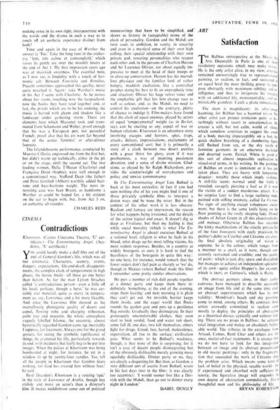CINEMA
Contradictions
Khartoum. (Casino Cinerama Theatre, 'U' cer- tificate.)—The Exterminating Angel. (Aca- demy, 'X' certificate.) You could hardly make a dull film out of the end of General Gordon's life, which was all too cinematic. Characters, scenery, events, dangers. expectations, life-and-death disappoint- ments, the complex clash of temperament in high places, the heroic finale—all these go one better than fiction. As for the man Lytton Strachey called 'a contradictions person—even a little off his head, perhaps, though a hero,' he was cer- tainly star material, quite as starry in tempera- ment as, say, Lawrence, and a lot more likeable. And since the Lawrence film showed us the marvellously photogenic quality of desert and camel, flowing robe and charging tribesman, palm tree and muezzin, the whole atmosphere vaguely labelled Islamic, the eccentric, almost hysterically regarded Gordon came up, inevitably I suppose, for treatment. Always one for the grand gesture, for seeing the symbolic significance of things, he crammed his life, particularly towards its end, with incidents that fairly beg to be put into images. When the palace at Khartoum was being bombarded at night, for instance, he sat in a window lit up by twenty-four candles. 'Go, tell all the people in Khartoum that Gordon fears nothing, for God has created him without fear,' he said.
Basil Dearden's Khartoum is a rousing 'epic' in the style of Lawrence of Arabia, though less stylish; and more an actor's than a director's film. It makes middlebrow sense out of political manoeuvrings that have to be simplified, and' shows us history in (acceptable) terms of the clash of personality. Gordon and the Mandi are twin souls in ambition, in vanity, in sincerity and even in a mystical sense of their own high calling, their special relationship with their own private god; towering personalities who respect each other and, in the persons of Charlton Heston and Sir Laurence Olivier, are about equally im- pressive to meet at the head of their troops or in close-up conversation. Heston has his marvel- lous physique and the familiar look of rather hungry, maddish exultation, like a controlled prophet doing his best to fit an unprophetic time and situation; Olivier his huge velvet voice and the emphathic gift that lets him change race as well as colour, and, as the Mandi, no need to control his exultation—on the contrary, plenty of chance to indulge it. Film-makers have found that the clash of equal enemies, played by actors of equal 'temperamental' weight (as in Becket, say), can be exciting as any aspect of war or human relations. Khartoum is an adventure story involving escapes and horrors, spies, traps, attacks, defeats, improvisations, excitements of every conventional sort; but it is primarily a story of a clash between two desert ascetics with a great thirst for glory, even if it was posthumous, a way of inspiring passionate devotion, and a sense of divine mission. Glad- stone, as played by Sir Ralph Richardson, pro- vides the counterweight of everydayness and policy and unwise commonsense.
In The Exterminating Angel Luis Bunuel is back at his most surrealist; in fact if you had seen nothing else of his you might find it one of those privately symbolic films to interpret a dozen ways and be none the wiser. But in the context of his other work it is less obscure. Realism and fantasy are interwoven, the reason for what happens being irrational, and the details of the action logical and exact. It doesn't dig as deep as Viridiana, but then my feeling is that while social morality (which is what The Ex- terminating Angel is about) exercises Bufwel at a rational level, religion is what he feels in his blood, what drags up his most telling visions, his most violent responses. Besides, in a country as widely bourgeois as ours it is hard to feel the beastliness of the bourgeois in quite this way: no one here, for instance, would remark that the lower orders don't feel pain as sharply as 'we' do, though in Mexico (where Buiiuel made this film) I remember some pretty similar observations.
He puts a number of rich dull people together at a dinner party and keeps them there in- definitely. Something, at the end of the evening, stops them leaving; and next morning it is plain they can't get out. An invisible barrier keeps them inside, and the eager world that flocks rounds the garden gate and puts up a pestilence flag outside. Gradually they disintegrate. In their grotesquely uncomfortable clothes, they soon start to look sordid; food and water run short, some fall ill, one dies, two kill themselves, others fight for drugs. Greed, lust, hatred, malevolence, superstition, all rise to the surface; civilisation goes. What seems to be Builuel's weakness, though, is that none of this is surprising, for it isn't a case of decent people disintegrating but, of the obviously dislikeable merely growing more squalidly dislikeable. Dinner party or no, they are clearly a disgusting lot. But then, as Gordon, a very different sort of ascetic from Builuel, wrote in his last days (not in the film: it was clearly too eccentric): 'I would sooner live like a Der- vish with the Mandi, than go out to dinner every


































 Previous page
Previous page